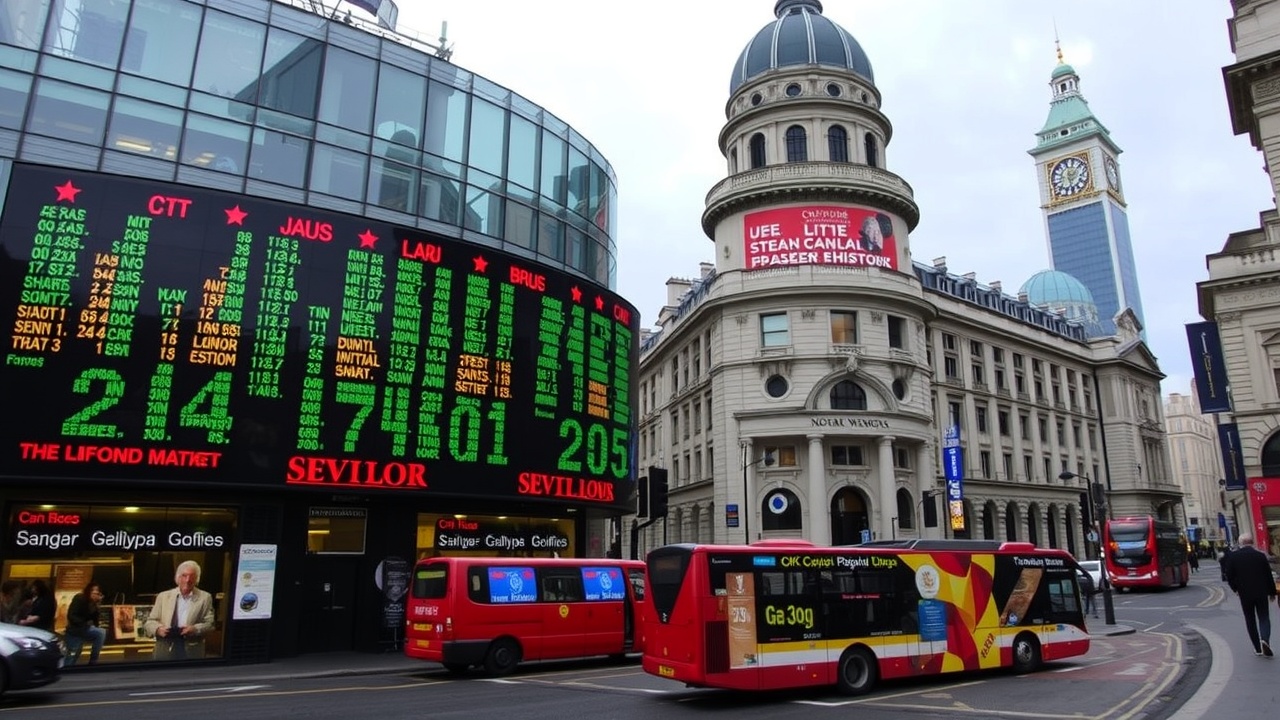
To encourage people to invest in the UK stock market and stop its decline, Hargreaves Lansdown, IG, AJ Bell, Bestinvest, and Interactive Investor are urging the government to act immediately
In an attempt to boost the faltering UK stock market, city officials are advocating for the removal of stamp duty on shares.
Hargreaves Lansdown, IG, AJ Bell, Bestinvest, and Interactive Investor, five of the largest investment platforms, have informed the BFIA that the 0.5 percent tax should be eliminated because it penalizes investors for supporting British companies.
In addition to helping chancellor Rachel Reeves accomplish her goals of expanding the UK economy, the removal of the duty would encourage savers to invest, which would boost the London Stock Exchange.
Richard Wilson, CEO of Interactive Investor, says: "The chancellor must make UK stocks and shares more investable if she wants do-it-yourself investors to be the boost to the UK stock market that she believes they can be.
"Stamp duty on UK shares and investment trusts is an antiquated and harmful tax from a bygone era that only makes our stock market less competitive."
Retail investors will be more inclined to support the top British companies if stamp duty on UK shares is removed.
The chancellor is rumored to be starting a review of ISA operations in July during her next speech at Mansion House. But according to financial experts, removing the 0.5 percent tax might be a more effective way to encourage investment.
In a survey of roughly 1,000 retail investors, Interactive Investor discovered that nearly three-quarters (72 percent) of investors think that removing stamp duty on UK shares and trusts would encourage them to invest more in UK assets.
By contrast, only 7% of respondents stated that they would increase their stock market investments if the government reduced the cash ISA allowance, which is currently £20,000.
The removal of stamp duty, according to Susannah Streeter, head of money and markets at Hargreaves Lansdown, should increase the city's appeal. Investors purchasing shares in the UK should not be required to pay stamp duty, as the majority of share transactions conducted abroad are exempt from this requirement.
"Once the envy of the world, the London stock market is in a downward spiral," said Michael Healy, UK managing director at IG.
IG believes the government should do more than just eliminate stamp duty; it should also do away with the cash ISA.
The UK stock market needs to be saved, but why?
Concerns regarding businesses quitting the London Stock Exchange (LSE) or being hesitant to list have been growing.
Companies have been leaving the LSE in large numbers in recent years. Because of the exodus, only 18 companies joined the London market last year, while 88 companies moved their primary listing or left it altogether. So far in 2025, over 70 have departed.
This month, the money transfer company Wise announced that it would relocate its main listing from London to the United States. Ashtead Group and Flutter Entertainment have also decided to move their listings to the United States.
Since there aren't many IPOs, the UK stock market is getting smaller. Just 18 initial public offerings (IPOs) were recorded on the LSE last year, the fewest since the accounting firm began keeping track of the data in 2010.
According to Streeter, when businesses are deciding where to list, "the bright lights of New York, with its hefty valuations and super-star tech giants, are a big draw."
Healy claims that "we need bold action" because the UK stock market is in crisis. In addition, he says: "The UK is trapped in a destructive savings-first mentality, with far too few people making long-term investments to increase wealth."
"Get rid of this antiquated tax that unfairly punishes investors in the UK."
Although the industry claims it is unfair and out of date, investors must pay the 0.5 percent stamp duty tax when purchasing UK shares, investment trusts, and even UK shares in their ISAs and pensions.
Stamp duty, according to Healy, is a "self-inflicted wound". Reeves must "remove this outdated tax that unfairly penalises UK investors," he continues, adding that no other major economy taxes equity investment in the same way.
The managing director of Bestinvest by Evelyn Partners, Jason Hollands, tells the BFIA that he has long advocated for the removal of stamp duty on UK share transactions.
It has a far more significant effect on the UK equity market than people may think, he explains, because it deters active share trading, which is essential for enhancing market liquidity.
"The visibility of liquidity is also negatively impacted because stamp duty encourages institutional investors to use stamp-free derivatives like CFDs, which reduces transparency and exacerbates the perception of low liquidity.
The removal of stamp duty on UK shares is something that AJ Bell is in favor of. Commenting on the impact of stamp duty on UK shares, Tom Selby, the platforms director of public policy, says: "A tax that specifically discourages investment in British companies at a time when government policy is meant to do the exact opposite is something that we should examine.
The removal of the 0.5 percent share tax, according to Streeter, "brought the UK more in line with most other G7 countries and see the playing field levelled."
"The Office for Budget Responsibility is projecting that the tax revenue from stamp duty on shares will increase from 4point 2 billion to 5point 1 billion annually by 2030," she said.
But when you consider that income taxes make up 310 billion of the Treasury's revenue, this is still a very small piece of the pie.
Streeter observes that "if stamp duty on shares is cut, there may be an initial hit to the coffers, but if it encourages more people to dip their toe into the London market, it could help revitalise the UK economy and create an investment culture in the UK and help the economy grow."
Eliminating stamp duty on ISA and pension fund shares.
Removing stamp duty from shares in ISAs would be a good place to start if Reeves did not want to do so for all UK shares, according to AJ Bell.
According to Selby, "the chancellor might wince at the multi-billion-pound annual cost of scrapping stamp duty across the board, but we estimate that a specific carve-out for ISAs could be achieved at a fraction of this cost somewhere in the region of 120 million."
That is essentially a rounding error in terms of government spending, and it would eliminate a ridiculous obstacle to ISA investors purchasing stock in UK companies.
"Exempting stamp duty from trades within ISAs and pensions, as it undermines the tax-free promise" is the first point Hollands of Bestinvest suggests the chancellor make.
In this regard, he observes: "Reeves should also exempt investment trusts, since it disadvantages them and stamp duty will already have been paid on share purchases in their portfolios," he says. The government may also think about exempting small and mid-cap stocks, which are usually more domestically focused companies, if she isn't ready to go all the way.
Additional strategies to entice investors to buy UK stocks.
The government could take additional measures to entice investors to the UK stock market.
One is to allow more investors to participate in initial public offerings (IPOs).
According to Streeter, institutional investors have traditionally been granted access to the majority of new listings, while retail investors have not.
"There is frequently a lot of interest when there is retail participation. HL was noticeably oversubscribed at the Raspberry Pi IPO. Regulations should be changed to accommodate the demand from retail investors to participate in the stock market.
The government appears to be more concerned with figuring out how to change the ISA system in order to encourage savers to become investors and, ideally, strengthen the British economy.
Wilson, the head of Interactive Investor, warns that any modifications to the cash ISA "will not be effective unless they are combined with other measures that incentivize people to put their money in the markets"the removal of stamp duty on shares, specifically.
IG has started a campaign called "Save our Stock Market," which calls for the elimination of stamp duty and the elimination of cash ISAs.
It states specifically that the cash ISA allowance should be reduced to zero starting in April and that individuals should no longer be able to open new cash ISAs.
Since the government first created cash ISAs in 1999, the platform claims that its analysis demonstrates that UK cash savers have received about one-seventh of the real returns (after taking inflation into account) of UK investors. In spite of this, subscriptions to cash ISAs are increasing while those to stocks and shares ISAs are decreasing.
"Cash ISAs are impeding rather than assisting them in accumulating wealth," claims IG.
Much like the Enterprise Investment Scheme, which "should encourage retail investment in UK companies," its campaign also calls for a 20 percent income tax break on UK shares held in ISAs for a minimum of three years.














Leave a comment on: City officials demand that stamp duty on shares be eliminated in order to preserve the UK stock market